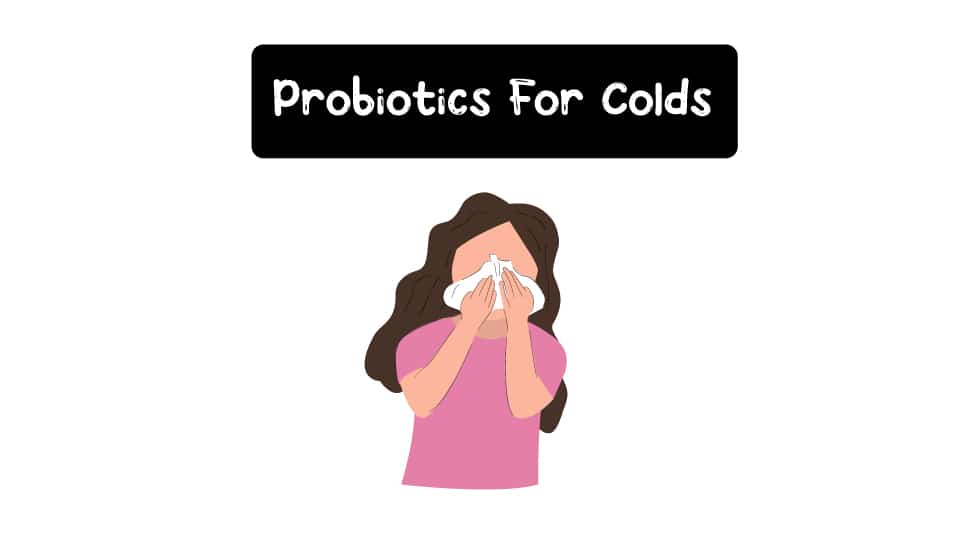Probiotics For Colds & Flus: Immune System Benefits

Probiotics play a beneficial role for colds & flus by inhibiting the replication of viruses, enhancing the production of antibodies, and fortifying the immune system. They contribute to strengthening the body's defenses against colds, flu, and respiratory infections.
Colds and flus are respiratory infections caused by viral pathogens that result in symptoms such as nasal congestion, sore throat, coughing, fatigue, and in the case of flu, often accompanied by fever, headache, and muscle soreness.
Probiotics are live microorganisms that, when consumed in adequate amounts, provide health benefits by promoting a balanced gut microbiota and supporting various aspects of the body's immune and digestive systems.
Do Probiotics Help Prevent Colds?
Probiotics have been found to have a positive impact on the immune system, which plays a crucial role in defending the body against various pathogens, including the common cold. By enhancing immune function, probiotics can help reduce the risk of catching a cold or flu, and even if an individual does get infected, probiotics may help lessen the severity and duration of symptoms.
The immune-enhancing properties of probiotics involve stimulating the production of antibodies and other immune cells that target and neutralize harmful viruses. Probiotics help maintain a healthy balance of bacteria in the gut, which is linked to improved immune function. A healthy gut microbiome can enhance the body's overall immune response, making it more resilient against cold-causing pathogens.
While probiotics alone cannot guarantee complete prevention of colds, incorporating them as part of a comprehensive approach to immune health, which includes proper hygiene practices and a well-rounded lifestyle, can be beneficial. It's important to note that individual responses to probiotics may vary, and consulting with a healthcare professional is advisable for personalized guidance.
is it Safe to take probiotics while sick?
Taking probiotics while you are sick with a cold or flu is generally safe and unlikely to worsen your illness. However, it's important to note that probiotics may not have an immediate impact on the duration or severity of your symptoms.
Probiotics work by modulating the gut microbiota and supporting immune function but research suggests that it can take at least 2 to 3 weeks of regular probiotic consumption to see significant changes in gut bacteria and experience potential anti-inflammatory effects.
What is the Flu?
Influenza, commonly known as the flu, is a contagious respiratory illness caused by influenza viruses. It is distinct from the common cold due to the severity of symptoms it presents. While a cold typically manifests as a milder set of symptoms, such as a runny nose, sore throat, and cough, the flu tends to be more severe and can lead to serious complications.
The main difference between a cold and the flu is the severity of symptoms, and the flu is caused only by a viral infection. Cold and flu can be more dangerous for older individuals and those with weakened immune systems main probiotics more important.
Can Probiotics Cause Flu Like Symptoms?
Probiotics can cause flu like symptoms in some people when taking probiotics for the first time because of what is known as a the Herx Reaction. The Herx Reaction, is a temporary and often uncomfortable response that occurs when the body undergoes detoxification or treatment for certain infections, characterized by the exacerbation of existing symptoms or the emergence of new ones as a result of the release of toxins during the healing process.

The flu is caused exclusively by viral infections, primarily influenza A and influenza B viruses. These viruses can spread from person to person through respiratory droplets when an infected individual coughs, sneezes, or talks like in the graphic above. It can also spread by touching surfaces contaminated with the flu virus and then touching the mouth, nose, or eyes.
How Do Probiotics Help Immune System?
A 2023 study authored by C Mazziotta, found certain probiotic bacteria can boost the immune system by increasing IL-10 production, managing inflammation, and strengthening mucosal membranes. Probiotic bacteria have health-promoting and immunomodulatory properties, improving immune functions and potentially offering cost-effective alternative solutions for disease management.
Is 70% Of The Immune System In The Gut?
What Else Can You Do To Prevent The Common Cold?
- 1Maintain good hygiene practices: Wash your hands regularly with soap and water for at least 20 seconds, especially after being in public places or touching surfaces that may be contaminated. Avoid touching your face, particularly your eyes, nose, and mouth, as this can introduce viruses into your body.
- 2Spend time outdoors: Spending time in the fresh air and sunlight can have positive effects on your mood and immune system. Aim for at least 20 minutes of outdoor activity each day to help your body adapt to weather changes and boost your immune response.Take immune-boosting supplements: Consider adding supplements known to support the immune system, such as Vitamin C, Vitamin D, and Zinc, to your daily routine. However, consult with a healthcare professional before starting any new supplements to ensure they are suitable for you.
- 3Take probiotics when using antibiotics: If you need to take antibiotics, it's important to replenish the good bacteria in your intestines that may be affected by the medication. Take a high-quality probiotic supplement during and after your antibiotic treatment to support a healthy gut microbiome.
Remember that these tips can help reduce your risk of catching a cold or flu, but they do not guarantee complete immunity. If you develop severe symptoms or have concerns, consult with a healthcare professional for appropriate guidance and treatment.
Dr. Sara Mesilhy has a Master’s degree in Gastroenterology and holds a membership with the Royal College of Physicians of the United Kingdom. She completed her Bachelor of Medicine, Bachelor of Surgery (MBBS) at Cairo University and is currently part of the ProbioticReviewGirl medical team.